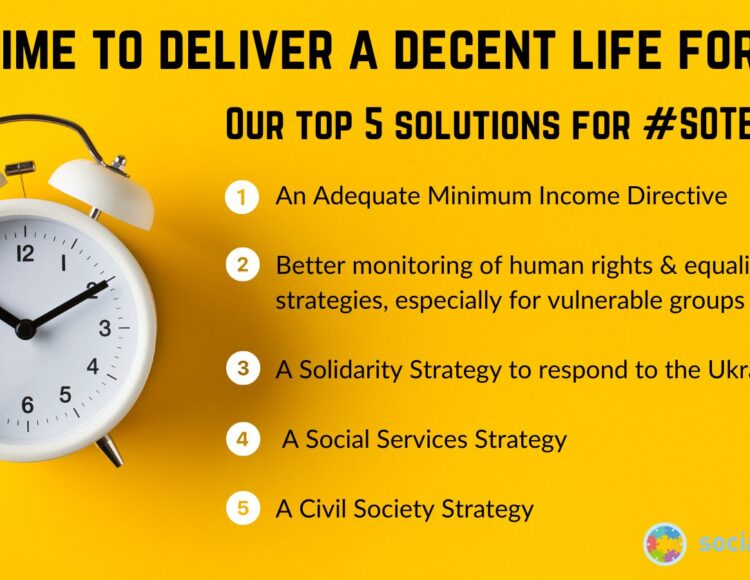Although last year’s State of the European Union (SOTEU) focused on the ‘soul of Europe’, it made little mention of social rights. Yet, in the face of multiple crises including the soaring cost-of-living, Russia’s invasion of Ukraine, rising energy poverty and climate change, people in the EU show time and again that the soul of Europe really lies in our shared values, solidarity and social cohesion. This year’s SOTEU needs to acknowledge that more can be done at EU level to fight poverty and social exclusion, and to promote gender equality and equality more broadly, non-discrimination and decent work for all. Read our letter.
Dear President von der Leyen,
As the largest, leading organisation working on social issues, Social Platform unites tens of thousands of organisations and hundreds of millions of people in Europe and hopes to see the following included in September’s SOTEU to show that the EU is listening and responding to what Europeans want, a more social and equal Europe:
1. Strong social safety nets through the European Pillar of Social Rights – the EU has changed since the Social Pillar was introduced. From crisis after crisis, to the green and digital transitions which are an opportunity to deliver an affordable and decent life for all people, we need more ambition, not less, but only one concrete action is planned under the Social Pillar for 2023. The SOTEU should announce a Framework Directive on Adequate Minimum Income to protect and empower the most vulnerable in our communities, who must not be left to shoulder the social and economic burden of our changing world.
2. A union of equality – the EU is a global champion for human rights and equality, and the lack of political will to unblock the Equal Treatment Directive must not be used as an excuse not to strive to do better. The EU has some good strategies, but we also need to know the situation on the ground. The SOTEU should call for better monitoring and reinforcement on how existing equality strategies and Action Plans are being implemented, their synergies, and what their impact is on the diverse groups that make up our union, including Roma, migrants, minorities and racialised groups, women, children, young and older people, LGBTI people, people with disabilities and people living with rare diseases facing individual, multiple and intersectional discrimination.
3. Supporting solidarity with Ukraine – as the war in Ukraine looks increasingly likely to become a protracted crisis, we recognise that solidarity will take constant work and reassurance across our societies and support from authorities at all levels. Europe needs to move beyond short-term emergency reactions to a coordinated, well-managed response that keeps communities and institutions in Europe engaged and supportive. The SOTEU should introduce a Solidarity Strategy including more structural investment, access to services, and support for those actors responding to the crisis.
4. Empowering social services – the last two years have seen civil society, not-for-profit social service providers and social economy actors rise to the challenge to provide essential services. Yet the social services sector is suffering from a lack of investment and the knock-on effect of years of austerity, making it increasingly difficult to do the vital work millions of people depend on. The SOTEU should introduce an EU Social Services Strategy that supports services in and out of crises and uses the full potential of not-for-profit social services in delivering on the Social Pillar.
5. An EU with and for its people – the Conference on the Future of Europe was a first listening exercise on the hopes and needs of people in the EU, but its success will be measured by how European leaders act on the outcomes. The Conference highlighted the lack of understanding and value of civil dialogue, and the underrepresentation and underparticipation of minorities in agenda-setting. The SOTEU should put forward an EU Civil Society Strategy to address this lack of understanding and the weakening of civil dialogue.
Finally, to be a truly inclusive SOTEU, accessibility measures including sign language interpretation, live subtitles and web-accessible documents must be provided to make the address as accessible as possible to people in Europe, including people with disabilities.
